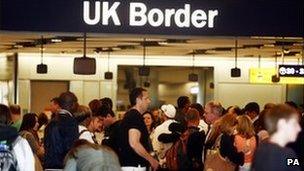Government facing lawsuit over e-borders project
- Published

The system is due to be fully in place by 2014
The government is being sued over its decision to sack the firm which managed its e-borders immigration system.
Raytheon is seeking more than £500m in damages, saying the decision to terminate the contract last year was "unjustified and unlawful".
At the time, ministers attributed the move to delays in the project and it having "no confidence" in the firm.
But Raytheon, which has since been replaced, said problems were due to mismanagement by the UK Border Agency.
Details of the lawsuit emerged in correspondence between the US-based firm - which is also a major IT supplier to the Ministry of Defence - and the Home Affairs Select Committee.
Launched by the last Labour government, the £750m e-borders project is designed to collate and store information on all passengers who enter and leave the UK on a single database by 2014 to enable the police and immigration officials to check them against "watch lists".
'Disappointing'
Two months after taking power, the coalition government ended Raytheon's contract to build and develop the system in July 2010, saying its performance had been "extremely disappointing".
Ministers said the firm had missed key targets in 2009, future deadlines had slipped by a year and they had no faith in Raytheon "being able to address the situation".
But, in a letter to Home Affairs Committee chairman Keith Vaz, a senior Raytheon executive said the firm was in "arbitration" with the Home Office and "vigorously refuted" claims that it had failed to meet its contractual obligations.
"It is Raytheon's position that the decision was unjustified and unlawful not least because the delays and other problems on the e-Borders programme was attributable to breaches of contract and serious mismanagement of the programme by the UKBA and not to any fault on Raytheon's part," Robert Delorge, the firm's UK chief executive, said.
The firm argues the first phase of the project was largely completed ahead of schedule in May 2009, while delays in the second phase were partly caused by the fact the Border Agency was "never able to settle upon the scope of its requirements".
Raytheon said ministers had also backtracked on an outline agreement to restructure the project following a review of all major IT schemes undertaken after the coalition came to power.
Instead of going ahead with this arrangement - which would have handed some responsibilities to Japanese firm Fujitsu - Raytheon said its contract was ended without consultation.
Mr Delorge added: "We maintain that the purported termination was unlawful and that Raytheon is entitled to recover substantial damages for wrongful termination."
First piloted in 2004, the e-borders system relies on information collected by airlines, ferry and train operators, and passed onto the authorities before departure.
'Capabilities missing'
In a letter to Mr Vaz, Immigration Minister Damian Green confirmed that arbitration was "ongoing" between the UK Border Agency and Raytheon - "the details of which cannot be discussed due to obligations of confidentiality".
Among the objectives Raytheon was expected to meet, Mr Green added, were targets for tracking 60% of all passenger movements by December 2009, rising to 95% a year later, and establishing the National Border Targeting Centre by December 2010.
He said "important capabilities" were missing as part of the delivery of phase one of the project, phase two had only been "conditionally accepted" while latter phases had not been "achieved" at all.
The contract was subsequently tendered again and awarded to IBM and Serco.
The coalition has said it has begun to get to grips with what it argues was its predecessor's wasteful record on IT procurement, in areas ranging from the NHS to defence.
Earlier this month, the Cabinet Office said it had saved £150m by halting or scaling back spending on the government's largest IT projects while a further £300m had been saved on lower-value schemes.
- Published22 July 2010
- Published25 August 2011